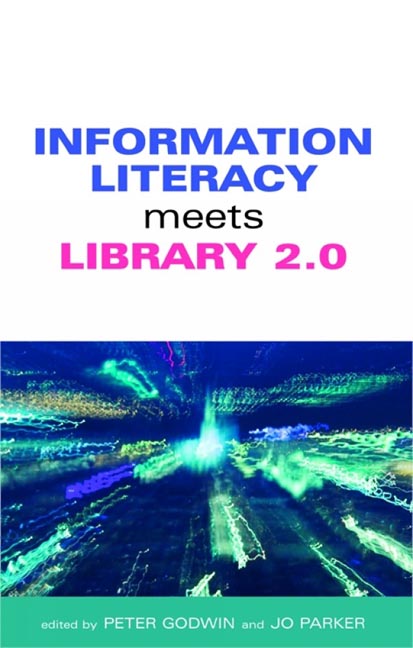Book contents
- Frontmatter
- Contents
- Contributors
- Acknowledgements
- Part 1 The basics 1
- Part 2 Library 2.0 and the implications for IL learning 37
- 3 Educating Web 2.0 LIS students for information literacy
- 4 School Library 2.0: new skills, new knowledge, new futures
- 5 Information literacy, Web 2.0 and public libraries: an exploration
- Part 3 Library 2.0 and IL in practice 75
- Part 4 The future
- Index
4 - School Library 2.0: new skills, new knowledge, new futures
from Part 2 - Library 2.0 and the implications for IL learning 37
Published online by Cambridge University Press: 08 June 2018
- Frontmatter
- Contents
- Contributors
- Acknowledgements
- Part 1 The basics 1
- Part 2 Library 2.0 and the implications for IL learning 37
- 3 Educating Web 2.0 LIS students for information literacy
- 4 School Library 2.0: new skills, new knowledge, new futures
- 5 Information literacy, Web 2.0 and public libraries: an exploration
- Part 3 Library 2.0 and IL in practice 75
- Part 4 The future
- Index
Summary
Introduction
Libraries have been an integral part of civilization – providing a ponderous archive of knowledge and lasting record of the human spirit. From Alexandria to the present, a key purpose of libraries has been to store information and be a place of research and learning. Fast forward to the 20th century, when drawing on this heritage we saw the emergence of school libraries positioned right at the centre of learning for our children and young adults.
From such an august heritage, our school libraries have shown their value and purpose many times over, and their successes have been recorded through personal experiences and research studies. There are many school library impact studies (Library Research Service, 2007), the best known being the Colorado Studies, which prove that school libraries have a direct link to student achievement. We know that school libraries make a difference to student learning (International Association of School Librarianship, 2007).
Two elements of a school library have stood the test of time. The first has been to nurture literacy and promote the pleasure of reading. The second has been to provide pathways to information and knowledge by promoting information literacy skills and processes. The point is that school libraries have a distinct function and purpose, both similar to and different from other libraries, which draws on past, present and future possibilities in that unique school library mix of the literary, cultural, recreational, and research needs of our ‘learner’ students.
The school library provides an organizational and educational centre for students and teachers striving to meet the demands of modern learning and the requirements of the learning programmes outlined by local authorities or governments. What is it about learning that is changing the scope of the school library's function and purpose? What does it mean to be a teacher librarian, a school librarian or school media specialist in a Web 2.0 world?
The internet is undergoing a transformation. The net is a child in terms of the maturation of information technology, and in its current evolution to the ‘semantic web’ with its emerging methods of information extraction, concept tracking and semantic analysis of data.
- Type
- Chapter
- Information
- Information Literacy Meets Library 2.0 , pp. 51 - 62Publisher: FacetPrint publication year: 2008
- 2
- Cited by



